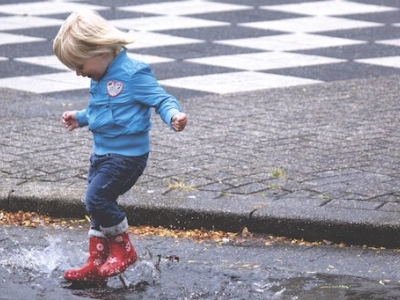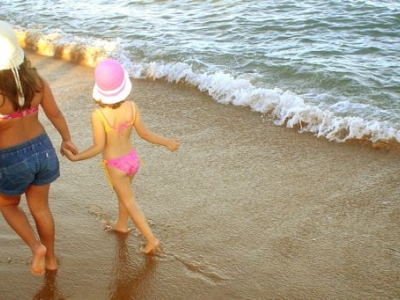Tips for travelling with young children
Sophia Sinclair shares some handy tips for surviving your next family holiday.
Many parents are terrified of travelling with young children, and I can understand why. The internet is full of horror stories and well-meaning, but disappointing, posts from people who want kids out of planes, cafes and public society in general. What’s a parent to do?!
While the grumpy curmudgeons of the internet wax lyrical about ‘parents these days’, you will find many people who are more than willing to give you a hand when you need it; people who play peekaboo with your baby, or give you an encouraging smile while you calm a meltdown in the middle of an airport.
Pray for God to provide helpers, and look out for them. And, if you happen to be travelling child-free one day, do offer support and encouragement to other parents. Many in our culture do not prioritise the inclusion of children, let’s be counter-cultural and welcome the little children with the same enthusiasm as Jesus.
It IS possible to travel with a young family, in fact, it can even be kind of fun. Here are some tried and tested tips which have worked for us.
It’s all about options
Having a diverse bag of tricks is my number one piece of advice. It takes a bit of preparation but it is worth it on a long plane ride, ferry trip or car journey.
Take an assortment of age-appropriate toys and activities and reveal them one by one. Here are some ideas which have worked for us, and tips for keeping costs low:
- Colouring (downloadable pages are available to print off at home, no need to buy a new book)
- Animal/dinosaur figurines (consider borrowing or buying second-hand)
- Stickers (VERY cheap from dollar stores)
- An old wallet packed with homemade ‘credit cards’, money, feathers, stickers—anything flat that would be interesting to pull out and inspect
- Toy cars (I managed to get a whole box of pre-loved cars from some friends with older kids, and I just pull out a few ‘new’ ones when needed)
- Playdough (make your own!)
- Books, especially new stories which haven’t been read before (buy second-hand)
- A pack of cards (play memory match up games or snap)
- Audio books and child headphones (these are not cheap but good ones will last a long time)
- Games/videos on the iPad—keep this as a last resort, for those moments when a meltdown is near or absolute silence is required. We don’t even mention the i-word unless we absolutely HAVE to!
Keep them well fed
Hungry children are grumpy children, well, let’s face it—we all get a little hangry from time to time! Keep the snacks low in sugar and easy to dispense (pre-cut and portioned). It’s worth keeping in mind that you may have to dispose of your uneaten food when entering different states or travelling internationally.
Some ideas:
- Cut grapes or cherry tomatoes
- Cheese and crackers
- Popcorn
- Vege sticks (carrot/cucumber/capsicum)
- Muesli bars
- Bliss balls
- Finger sandwiches
- Pikelets
- Mini muffins
- Sliced fruit
Be prepared
Pack a change of clothes for each kid and one for you as well. I tend to choose lightweight options like baby onesies, shorts and tee shirts for the kids, and active wear tights and tees for myself. Store them inside large snap lock bags—you never know what smell or substance you’re going to need to store until you arrive!
I also take a thermometer and children’s pain relief medicine with me, especially if we’ll be travelling all day—we once flew with our toddler when he (unbeknownst to us) had a nasty ear infection. Worst. Flight. Ever.
Stay flexible
One of the best things we now do when we travel is give ourselves a lot of time. A LOT. For example, we always aim to be at the airport to check in as soon as check-in opens. This means one less line to stand in, and more time to get to our gate. Most airports have child-friendly spaces to burn off steam before a flight, which you can afford to do if you’ve arrived extra early!
When driving we allow for regular stops, every 1-2 hours. Our most recent road trip included our then six-week-old son, so we had to stop frequently to breastfeed and change nappies. Being flexible and allowing lots of time lets you accommodate the last minute trips to the toilet, tantrums and stops.
Another tip is to travel at night (if your kids settle well in cars/buses/planes, that is!).
Maintain routines
This doesn’t have to be rigid or complicated. Maybe you follow a similar bedtime wind down every night. Bath, stories, prayer, bed—these are the sort of cues which help our little people to find comfort in the familiar.
Perhaps it’s a favourite sippy cup or bag, a toy or item of clothing. Maintaining routines and familiar objects is an easy way to help your kids adjust.
Be available
I have one child who is particularly sensitive and often needs extra reassurance from me in the form of physical contact. This is one thing I cannot afford to ignore when we travel. As his parent, I represent home, safety and security. Carefully listening and patiently working through fears takes time and energy, and this can be a drain while we travel. But being available to my child allows him to thrive on a more erratic schedule.
Use your intuition
There is one thing I wish every parent would hear from their community more often: you are a uniquely qualified and gifted expert on your children.
You are the one who sees them at all hours of the day (and, let’s face it, night!). God has given you the privilege of unique insight into their likes/dislikes, temperament, limits etc. Many people may give you well-meaning advice, but it’s up to you to choose what suits you and your family.
This is a daunting task! God gives us wisdom when we ask for it, and he especially equips us with what we need to live a godly life—these promises apply to your parenting. Pray for this wisdom, cry out for it!
No matter where you are travelling these school holidays, take heart fellow parents: we are not alone.
For more articles from Growing Faith, subscribe to our monthly e-newsletter.
To hear about the latest books and resources from Youthworks Media, subscribe here.







